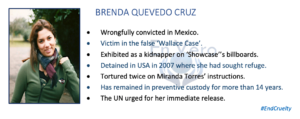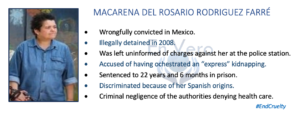Source: En Vero Spanish
Author: Francesca N.
November 8, 2017
Translation: Jorge B. (Original publication in Spanish on October 10, 2017)
Opinion: Corruption scandal at Colombia’s Supreme Court
In Colombia a fact of historical significance is taking place due to international cooperation agencies. The successful investigation and arrest of individuals, members of the Supreme Court of Justice and officials of government agencies have exposed a network of corruption collecting bribes to provide rulings according to the needs of their latest clients.
Thus, the director of the Anti-Corruption Unit of the Attorney General’s Office, Luis Gustavo Moreno Rivera, was arrested last June because he, together with his former office partner and the alleged authorization of the High Court’s Honourable President — whom he called “dad”—would ask for, collect and extort sums of money from those who had a certain paying capacity and, to those who would refuse, he would arrange their prompt arrest within court proceedings.
Therefore, one should ask the Honourable President José Leonidas*: What happened to that person who used to talk about righteousness, ethics and morals in his criminal procedure classes at the Instituto de Pensamiento Liberal (Institute of Liberal Thinking)? At what point did he move away from the path of impartiality, effort and the acquisition of knowledge as a source of intellectual and economic wealth that he advocated so much? Where was that professor so demanding both in class and with his concepts? Where did the warnings he made to his students about plagiarism end up?
Leonidas would walk proud as a peacock, greet others raising an eyebrow and always change his tone, as if he were a little uncomfortable, when women wanted to participate in class.
The judgement cases he would evaluate in our classes were among the best, the most important decisions made by the irreproachable Supreme Court of Justice in the late 1990s.
However, it seems that power, fame and the high office he held for eight years were more important than his good intentions to train law professionals, for he took a path now asking him to pay back, hopefully much a higher amount than what his henchmen demanded from the frightened clients, who had no other option than to pay up or end up being sentenced. Some deserved the judgment, others not, for lack of sufficient evidence. I speak not only for the cases of politicians, but also for those of the average citizen.
Unfortunately, law is a profession of interpretation. What for Leonidas was a real and concrete fact, for the duty judge did not have to be. This legal uncertainty has led to the non respect of legal precedents, to decisions in accordance with the position which best fitted those who had the money to pay for it or to those who had the political power to appoint staff to the different government departments.
Faced with such a legal catastrophe, some of us would consider it appropriate to create a contingency plan to review the cases the judges under scrutiny have ruled on. Some, aware of their errors, have acknowledged to have paid large sums of money and I believe there may be others who also paid, even if it is too early for us to know.
But what happens to those who did not have access to the good offices of the High Court’s henchmen? What happens to those sentenced simply because relatives of the powerful politicians wanted it so? Where is that possibility of true justice the Supreme Court of Justice used to exercise?
It has been left with what is fashionable: to have contacts, to do and owe favours, to charge for appointing a relative or friend, to link a person to an investigation, to close a lawsuit; that is what is “in,” to dine with the local politician, to accommodate justice according to the script ordered by the brother, son, cousin or friend of the area’s landowner; that is what ought to be has become.
Failure to act as previously suggested would have given rise to a declaration of non-compliance, to the non-assignment to a position, to a resignation request, to the non-renewal of a contract, to the transfer to areas of public order or difficult access, among others.
This is the right time to make a call to the different universities granting professional degrees without the requirements of years ago, where those who worked the hardest would get a degree and not the smart alecks who became friends with the professor.
I want to conclude by saying that after a crisis great changes can happen. It wouldn’t hurt the Colombian people to be given the opportunity to have once again intelligent, scholarly and qualified judges worthy of their positions.
The honourable judges will have an arduous task ahead to get through this critical moment. I say this because I see a large number of requests for review of the judgments pronounced by the Court cartel, activities that must be carried out with a magnifying glass, or perhaps not, since the corrupt ones were so sure that their decisions would never be reviewed by their peers.
Thank you Mussa, Nino, Kiko, Gnecco, because, as one great philosopher said, “you all misspoke” but opened the door to the unknown.
——————————————-
* Dr. Leonidas Bustos was the reporting judge in charge of studying the appeal of Judith Brassard, whose draft resolution resulted in confirmation of the conviction for this Canadian woman on June 26, 2013.
Semana magazine presents exclusive revelations of the conversations that Alejandro Lyons and Leonardo Pinilla had in Miami. The DEA’s recordings showed the web of corruption that existed at the Supreme Court of Justice: here.




